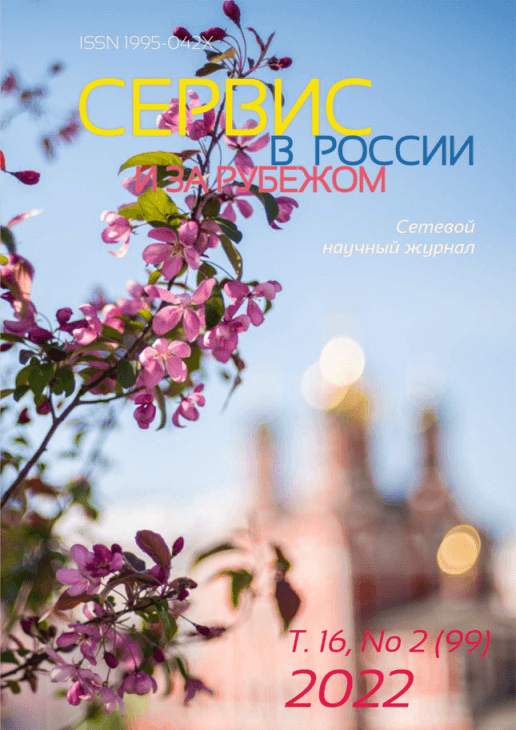ESG-transformation of the tourism and hotel industry
DOI:
https://doi.org/10.24412/1995-042X-2022-2-86-93Keywords:
tourism, hospitality, sustainable development, ESG concept, competitiveness, attractiveness, responsible financingAbstract
The article discusses the ESG-principles of economic development, which fully meet the concept of sustainable development. The key indicators of modern entrepreneurship are a responsible attitude to the environment (E-criterion), compliance with the social responsibility of business (S-criterion), and high-quality company management (G-criterion). Many enterprises from various industries already share ESG principles and actively use them in their activities. International rating agencies develop ESG ratings of companies that show the degree of commitment of enterprises to these principles. Russian agencies also form ESG ratings for domestic companies. However, this does not apply to enterprises in the tourism and hospitality industry, which have not yet been imbued with the ideas of ESG transformation and are not represented in the ratings. The article identifies the reasons that will contribute to the active ESG transformation of enterprises in the tourism and hospitality industry, including changes in the policy of providing responsible investments mainly to companies with a high ESG rating, ensuring the competitiveness and attractiveness of Russian enterprises in the tourism and hospitality industry in the world market services.
Downloads
References
Батаева Б.С., Кокурина А.Д., Карпов Н.А. Влияние раскрытия ESG-показателей на финансовые результаты российских публичных компаний // Управленец. 2021. №6. С. 20–32.
Беляева И.Ю., Козлова Н.П., Данилова О.В. ESG-факторы как инструмент формирования деловой репутации // Вестник Астраханского гос. технич. ун-та. Сер.: Экономика. 2021. №4. С.15–21.
Бондаренко В.А., Ларионов В.А. Исследование ценностных установок российских потребителей услуг "зеленых" гостиниц // Практический маркетинг. 2021. №1(287). С. 3-11.
Диваева Э.А. Условия трансформации ESG-принципов: экономические и социальные аспекты // Инновации и инвестиции. 2022. №1. С. 65-70.
Инновационно-технологическая трансформация промышленности в регионах России как инструмент достижения стратегических целей на пути становления цифровой экономики: Монография / Под ред. Веселовского М.Я., Измайловой М.А. М.: Изд-во «Научный консультант», 2019. 364 с.
Манухин А.И. ESG-практики в кредитовании компаний малого и среднего бизнеса // Финансовые рынки и банки. 2021. №11. С. 68-73.
Морозов М.А., Морозов М.М. Цифровые коммуникации как инструмент формирования единого информационного пространства в туризме // Вестник Российского нового ун-та. Сер.: Человек и общество. 2019. №2. С. 69-72.
Морозов М.А., Морозова Н.С. Инновационные тренды развития туризма и гостиничного бизнеса в условиях цифровизации // Естественно-гуманитарные исследования. 2020. №28(2). С. 196-202.
Морозов М.А., Морозова Н.С. Экономика туризма. М.: Юрайт, 2019. 291 с.
Морозов М.М. Особенности управления туристскими системами в условиях цифровой экономики // Туризм: право и экономика. 2018. №3. С. 7-10.
Сухачева В.В., Бичурин О.М. Учет тенденций и рисков ESG-инвестирования при управлении портфелем финансовых активов // Экономика и управление. 2022. Т.28. №1. С. 86-91.
Терентьев Н.Е. Зеленая экономика и ESG в условиях пандемии COVID-19: некоторые вызовы развития // Ученые записки Международного банковского ин-та. 2021. №3(37). С. 86-102.
Черненко В.А., Лядова Ю.О. Принципы ESG как фактор, влияющий на финансовую устойчивость предприятия // Национальная Ассоциация Ученых. 2021. №73-2. С. 17-20.
Gregory R.P. ESG scores and the response of the s&p 1500 to monetary and fiscal policy during the COVID-19 pandemic // International Review of Economics & Finance. 2022. Vol.78. Pp. 446-456.
Ionescu G.H., Firoiu D., Pirvu R., Vilag R.D. The impact of ESG factors on market value of companies from travel and tourism industry // Technological and Economic Development of Economy. 2019. Vol.25. Iss.5. Pp.1-30.
Morozov M.A., Morozova N.S. Attractive tourist destinations as a factor of its development // Journal of Environmental Management and Tourism. 2016. Vol.7. №1(13). Pp. 105-111.
Morozov M.M. Information and communication technologies in tourism // Sochi Journal of Economy. 2017. Vol.11. №4. Pp. 295-301.
Oehmke M., Opp M. A Theory of Socially Responsible Investment // Swedish House of Finance Research Paper. 2020. №20-2.
Plastun A., Bouri E., Gupta R., Ji Q. Price effects after one-day abnormal returns in developed and emerging markets: ESG versus traditional indices // North American Journal of Economics & Finance. 2022. Vol.59. Pp. 101572.
Vilas P., Andreu L., Sarto J.L. Cluster analysis to validate the sustainability label of stock indices: an analysis of the inclusion and exclusion processes in terms of size and ESG ratings // Journal of Cleaner Production. 2022. Vol.330. Pp. 129862.
Downloads
Published
How to Cite
Issue
Section
License
Copyright (c) 2022 M. A. Morozov, & N. S. Morozova

This work is licensed under a Creative Commons Attribution-NonCommercial-ShareAlike 4.0 International License.












